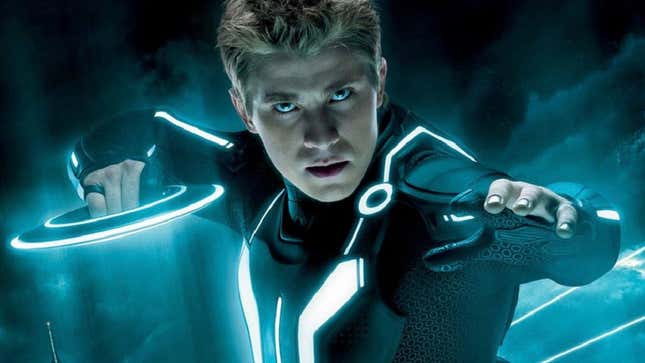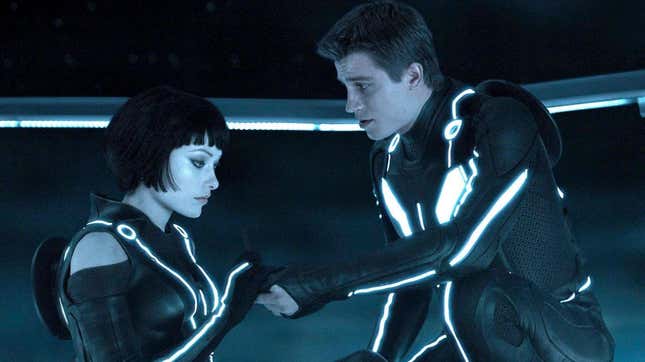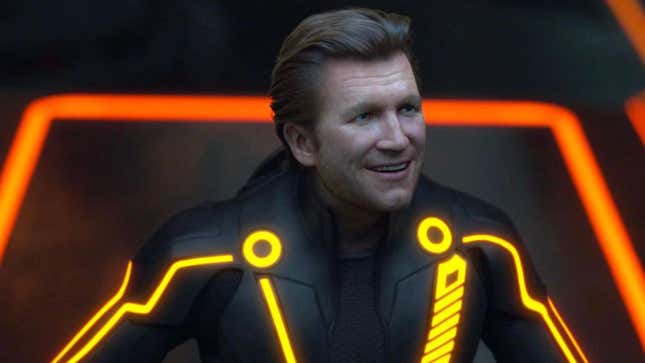Tron: Legacy is the type of sequel modern Hollywood dreams about, but rarely gets right. I figured this out a few weeks ago when, after seeing that Disney was finally in production on a long-awaited Tron 3, I went back and revisited the 2010 film. But, of course, one can’t simply revisit Tron: Legacy. You have to tee it up by rewatching the original 1982 Tron too, and the double-feature experience made Tron: Legacy shine for me in ways it never did upon initial release.
When Tron: Legacy was first released, I saw it in 3D IMAX and thought it was fine. It looked beautiful, the music was incredible, and for the most part, the effects were excellent too. Sure, de-aging Jeff Bridges looked awful but the ambition of it was at least noteworthy. Not being a huge Tron fan, I watched it, enjoyed it, and didn’t think much about it afterward.
Watching it now though, I finally got it. I finally saw what writers Edward Kitsis, Adam Horowitz, and director Joseph Kosinski were thinking when they made the bold move to bring Tron back almost 30 years after the original. They wanted to tell a story that didn’t just build off the first one, but a story that gave fans of the first film everything they could’ve dreamed of and more. Which, for the most part, they achieved.

These thoughts started forming as I was watching 1982’s Tron. That movie, while technologically groundbreaking for its time, never quite deals with the greater ramifications of its story. The film is about a programmer named Kevin Flynn (Jeff Bridges) who gets zapped inside a computer and has to destroy the evil AI inside to acquire a secret file that proves he was wronged by Encom, the video game company he works at. It imagines that inside the device you’re reading this on, there’s a world unto itself. Programs are just like people, doing jobs for their boss, aka the “user.” You. The concept is ripe for further exploration.
And yet, in Tron, the story largely plays out without any exploration of its implications. Everything is relatively straightforward and then it just kind of ends with Kevin Flynn beating the AI, recovering the file, and becoming the head of the company. What’s next, what Kevin learned from being inside, and how he’s going to use that knowledge is never explored.
Now, I didn’t see Tron when it was released—I’m old, but not quite that old—but watching it again, I couldn’t help but imagine how modern fandom would react to it. There would be Reddit pages, podcasts, and YouTube videos of people dissecting and speculating about every little detail. Millions of people predicting what a potential sequel could eventually be. I’m sure, in the early ‘80s, that happened too, just in its own way. The fact is though, you can’t watch Tron and not want to know more. Need to know more. Which is exactly what Tron: Legacy delivers.

Right from the start, Tron: Legacy makes it clear it knows both what fans of the original movie are craving and what a non-fan will find intriguing. It carefully works its way down a wishlist of burning questions and fan favorite winks all in service of an emotional, interesting family story. We learn that in the decades since the first film, Kevin Flynn made great use of his new power and knowledge, including making a game based on the experience called “Tron.” However, as he continued to explore the larger implications of what was now known as the Grid, he mysteriously disappeared. Flynn left behind a son, Sam, who technically controls Encom in his father’s absence, even though he doesn’t want to. Sam then gets sucked into the Grid, finds his father, who is fighting with an advanced AI version of himself. A great battle ensues, and ultimately Sam escapes back to reality with an artificially created life form called an ISO.
Admittedly, it’s a lot when you just lay it out there, but the main point here is how beautifully the film builds on what came before. It deals with questions fans had for years as well as questions they probably never even dreamed of. What would Flynn do with Encom? What other discoveries could be made in the Grid? How would that experience impact him in real life? It’s all there.
One of the more elegant touches is how Legacy deals with the name “Tron.” In the first movie, Tron is a heroic program that fights with Flynn against the evil Master Control Program. But we never find out what happened to Tron after that. So why is Tron: Legacy called Tron: Legacy at all? Well, as I said, we learn Kevin made a new game called “Tron”—and boom, an informative question is simultaneously posed and answered. (Later, Tron also comes back in a fun, surprising way just to give it a bit more impact.)
There’s also the fact that Kevin Flynn, after spending years inside the Grid, meets a whole new race of beings that were created inside. The ISOs. He understands that computers creating life is a history-changing concept and so he fights with all his power to try and save them, ultimately succeeding by having Sam bring the last ISO, Quorra, into reality. That whole storyline and idea is the next step in the evolution of the original movie. The original movie says “Programs look like people inside a computer.” Tron: Legacy says “Not only do programs look like people inside a computer, but those programs can also live and create themselves like people.” It’s the old Tron you knew, but now upgraded.

Upon rewatch, even the highly suspect de-aging effects on Jeff Bridges hit a bit differently. They still don’t look good, mind you, especially when Flynn is in the real world, but once the de-aged version of the character, Clu, is running the show on the Grid, the digital look somehow feels right. Years of video games and performance capture make us think “He would look like that in this world.” You just buy it.
Finally, after answering all your Tron fan questions, and taking the story to a whole new level while paying respects to everything you loved about the original, Tron: Legacy leaves us a whole slew of new questions. What does it mean now that not only is a piece of the Grid out in the real world, but that it’s something beyond a program or person? What will Sam do now that his experience on the Grid has changed him? The questions are once again endless and ripe to be explored in a sequel.
Is the third Tron movie—which stars Jared Leto, is titled Tron: Ares, and arrives in 2025—going to be where all that exploring happens? We don’t know. But as long as it learns the lessons of its predecessor, it’ll be fine. These days so many franchises make sequels to older films hoping to both honor the original while also moving the story ahead and just fail. Often miserably. And all they have to do is look at Tron: Legacy, which did it perfectly years before so many others attempted it. It’s freaking rad.
Tron, Tron: Legacy, and even the animated Tron: Uprising are all streaming at those links on Disney+.
Want more io9 news? Check out when to expect the latest Marvel, Star Wars, and Star Trek releases, what’s next for the DC Universe on film and TV, and everything you need to know about the future of Doctor Who.




















+ There are no comments
Add yours